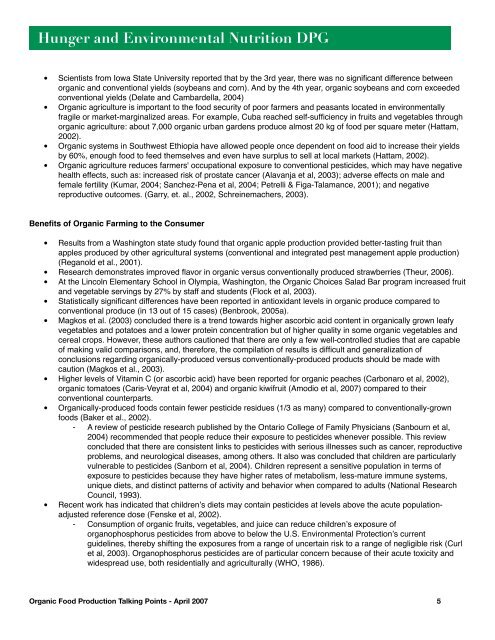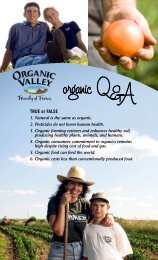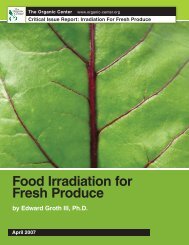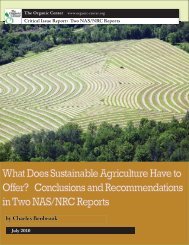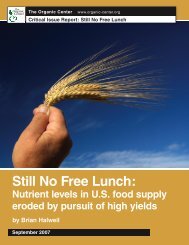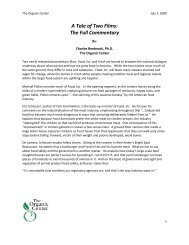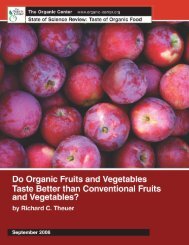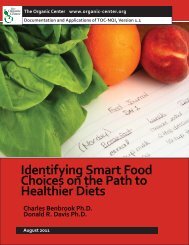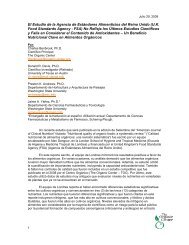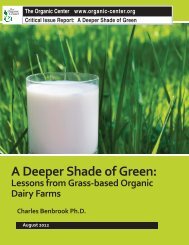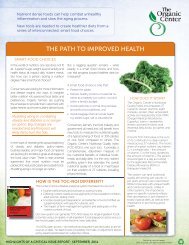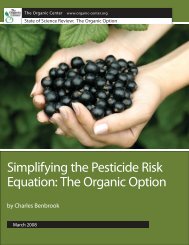Organic Food Production Talking Points - Hunger and ...
Organic Food Production Talking Points - Hunger and ...
Organic Food Production Talking Points - Hunger and ...
You also want an ePaper? Increase the reach of your titles
YUMPU automatically turns print PDFs into web optimized ePapers that Google loves.
<strong>Hunger</strong> <strong>and</strong> Environmental Nutrition DPG<br />
• Scientists from Iowa State University reported that by the 3rd year, there was no significant difference between<br />
organic <strong>and</strong> conventional yields (soybeans <strong>and</strong> corn). And by the 4th year, organic soybeans <strong>and</strong> corn exceeded<br />
conventional yields (Delate <strong>and</strong> Cambardella, 2004)<br />
• <strong>Organic</strong> agriculture is important to the food security of poor farmers <strong>and</strong> peasants located in environmentally<br />
fragile or market-marginalized areas. For example, Cuba reached self-sufficiency in fruits <strong>and</strong> vegetables through<br />
organic agriculture: about 7,000 organic urban gardens produce almost 20 kg of food per square meter (Hattam,<br />
2002).<br />
• <strong>Organic</strong> systems in Southwest Ethiopia have allowed people once dependent on food aid to increase their yields<br />
by 60%, enough food to feed themselves <strong>and</strong> even have surplus to sell at local markets (Hattam, 2002).<br />
• <strong>Organic</strong> agriculture reduces farmers' occupational exposure to conventional pesticides, which may have negative<br />
health effects, such as: increased risk of prostate cancer (Alavanja et al, 2003); adverse effects on male <strong>and</strong><br />
female fertility (Kumar, 2004; Sanchez-Pena et al, 2004; Petrelli & Figa-Talamance, 2001); <strong>and</strong> negative<br />
reproductive outcomes. (Garry, et. al., 2002, Schreinemachers, 2003).<br />
Benefits of <strong>Organic</strong> Farming to the Consumer<br />
• Results from a Washington state study found that organic apple production provided better-tasting fruit than<br />
apples produced by other agricultural systems (conventional <strong>and</strong> integrated pest management apple production)<br />
(Reganold et al., 2001).<br />
• Research demonstrates improved flavor in organic versus conventionally produced strawberries (Theur, 2006).<br />
• At the Lincoln Elementary School in Olympia, Washington, the <strong>Organic</strong> Choices Salad Bar program increased fruit<br />
<strong>and</strong> vegetable servings by 27% by staff <strong>and</strong> students (Flock et al, 2003).<br />
• Statistically significant differences have been reported in antioxidant levels in organic produce compared to<br />
conventional produce (in 13 out of 15 cases) (Benbrook, 2005a).<br />
• Magkos et al. (2003) concluded there is a trend towards higher ascorbic acid content in organically grown leafy<br />
vegetables <strong>and</strong> potatoes <strong>and</strong> a lower protein concentration but of higher quality in some organic vegetables <strong>and</strong><br />
cereal crops. However, these authors cautioned that there are only a few well-controlled studies that are capable<br />
of making valid comparisons, <strong>and</strong>, therefore, the compilation of results is difficult <strong>and</strong> generalization of<br />
conclusions regarding organically-produced versus conventionally-produced products should be made with<br />
caution (Magkos et al., 2003).<br />
• Higher levels of Vitamin C (or ascorbic acid) have been reported for organic peaches (Carbonaro et al, 2002),<br />
organic tomatoes (Caris-Veyrat et al, 2004) <strong>and</strong> organic kiwifruit (Amodio et al, 2007) compared to their<br />
conventional counterparts.<br />
• <strong>Organic</strong>ally-produced foods contain fewer pesticide residues (1/3 as many) compared to conventionally-grown<br />
foods (Baker et al., 2002).<br />
-! A review of pesticide research published by the Ontario College of Family Physicians (Sanbourn et al,<br />
2004) recommended that people reduce their exposure to pesticides whenever possible. This review<br />
concluded that there are consistent links to pesticides with serious illnesses such as cancer, reproductive<br />
problems, <strong>and</strong> neurological diseases, among others. It also was concluded that children are particularly<br />
vulnerable to pesticides (Sanborn et al, 2004). Children represent a sensitive population in terms of<br />
exposure to pesticides because they have higher rates of metabolism, less-mature immune systems,<br />
unique diets, <strong>and</strong> distinct patterns of activity <strong>and</strong> behavior when compared to adults (National Research<br />
Council, 1993).<br />
• Recent work has indicated that children"s diets may contain pesticides at levels above the acute populationadjusted<br />
reference dose (Fenske et al, 2002).<br />
- Consumption of organic fruits, vegetables, <strong>and</strong> juice can reduce children"s exposure of<br />
organophosphorus pesticides from above to below the U.S. Environmental Protection"s current<br />
guidelines, thereby shifting the exposures from a range of uncertain risk to a range of negligible risk (Curl<br />
et al, 2003). Organophosphorus pesticides are of particular concern because of their acute toxicity <strong>and</strong><br />
widespread use, both residentially <strong>and</strong> agriculturally (WHO, 1986).<br />
<strong>Organic</strong> <strong>Food</strong> <strong>Production</strong> <strong>Talking</strong> <strong>Points</strong> - April 2007! ! ! 5


